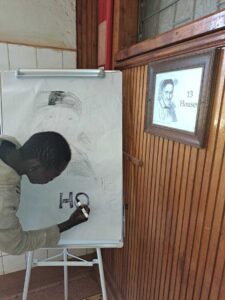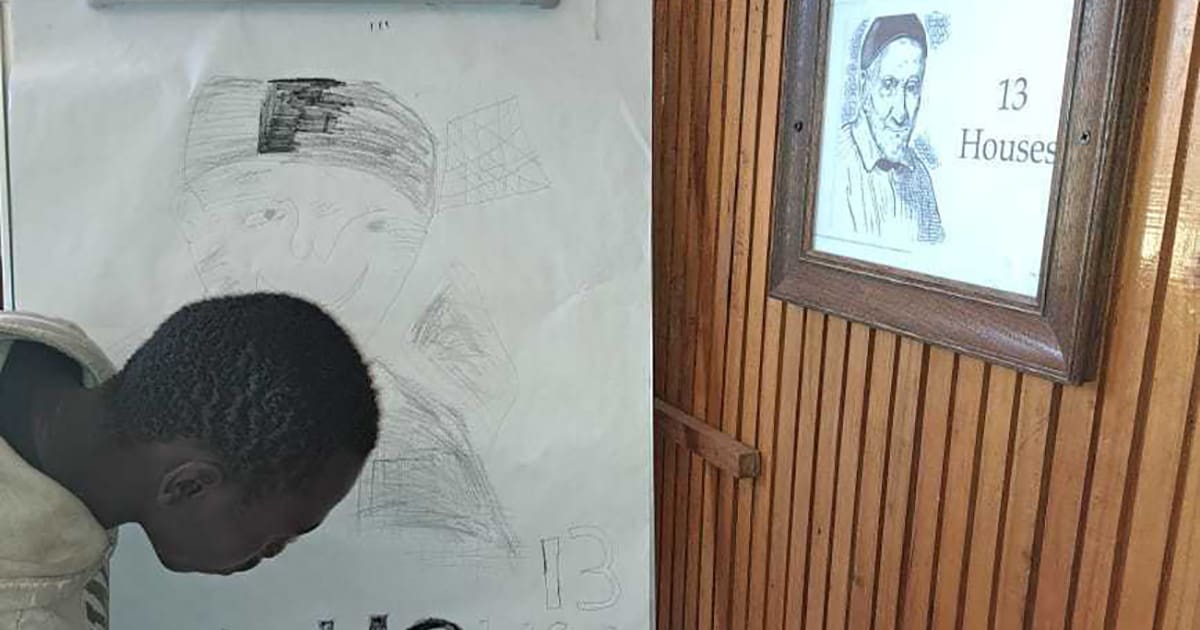The Daughters of Charity respond to homelessness affecting children in the streets of Kitale (Kenya)
Each year, on October 10th, World Homeless Day provides us with an opportunity to educate people across the world about homelessness issues, and to reflect on how homelessness can affect people of all countries, paths of life and ages, especially children.
According to UNICEF, it is estimated that there are 100 million homeless children worldwide and 365 million children live in extreme poverty, struggling to survive on less than $1.90 a day. Children who grow up impoverished often lack access to basic essentials such as food, sanitation, shelter, healthcare and education. Children are also more than twice as likely to live in poverty than adults, and they are more vulnerable to its effects (https://www.unicef.org/social-policy/child-poverty).
 In Kitale, Kenya, there has been an attempt to find out the number of children and young adults living on the streets: according to Child Rescue Kenya, the local government and the police, there are approximately 700 children living on the streets. While the children and youth included in this number were counted at specific times and in specific locations, it is important to note that this is not the whole picture – we can assume that there will be children who were not counted for a number of reasons, such as security and a lack of access to streets and buildings (https://www.railwaychildren.org.uk/media/76730/rc116-kitale-headcount-report-2015.pdf).
In Kitale, Kenya, there has been an attempt to find out the number of children and young adults living on the streets: according to Child Rescue Kenya, the local government and the police, there are approximately 700 children living on the streets. While the children and youth included in this number were counted at specific times and in specific locations, it is important to note that this is not the whole picture – we can assume that there will be children who were not counted for a number of reasons, such as security and a lack of access to streets and buildings (https://www.railwaychildren.org.uk/media/76730/rc116-kitale-headcount-report-2015.pdf).
An interesting observation from the street homeless count was that there were more male than female children living on the streets. There can be several reasons for this, from cultural beliefs to the breakdown of family systems. For example, in cases where a father leaves the family, or if a child is born out of wedlock and the mother marries or remarries, the male children present a long-term responsibility of not just care, but also an expectation for the father to provide land for the males. Conversely, female children are often seen as an investment as the family will likely benefit from a bride token (https://www.railwaychildren.org.uk/media/76730/rc116-kitale-headcount-report-2015.pdf).
In Kitale, the Daughters of Charity are responding to the needs of male street children with their ‘Upendo Street Children Project’ (USCP), part of the 13 Houses Campaign.
In 2020, the Daughters started the project to respond to the lack of services for children over the age of 14. At the time, there were 4 drop-in centres in town, and none of them catered to the needs of children 15-18 years old.
The Daughters opened a drop-in centre and a rescue and rehabilitation centre, creating a safe environment that safeguards children from the dangers of the streets and secures a safe future through education and training programmes. The beneficiaries are homeless males who spend their nights on the streets and the verandas of Kitale Town. The USCP has been beneficial to each of them – in 2022, 30 children returned to the public-school system (primary and high), and a total of 13 beneficiaries pursued various courses, such as hairdressing, motor vehicle painting and catering. Many hours are also dedicated to restoring the connection between the boys and their families, and helping to create the conditions for the latter to welcome back the children. Today, 25 have been reunited with their families.
As part of a new campaign addressing child labour and child trafficking, the Daughters also held four advocacy awareness training sessions, and a radio talk show. The campaign received widespread local support and a local media station shared stories of the children on the streets. The campaign is part of a year-long programme, ‘Home First’, which is raising awareness of the causes of street homelessness, and its effects on children and families, the community and the local government.
To commemorate World Homeless Day, we want to share with you the story of one of the beneficiaries, Rajab, who gives thanks to the “Upendo Street Program” for their help in getting him off the streets and securing his first steps towards a brighter future.
Among the best 12 students: Rajab conquers his journey out of the streets
 Since he was very young, Rajab Abdalla was separated from his parents and was living with his grandmother who was alcoholic. Despite this difficult situation, his mum and grandmother held various jobs to support him and his siblings. Rajab’s mother soon moved to Nairobi looking for more secure work to support the family, but without much luck. When Covid-19 hit, unemployment affected the whole family – with no one to pay his school fees, Rajab dropped out and lived on the streets at the age of 15.
Since he was very young, Rajab Abdalla was separated from his parents and was living with his grandmother who was alcoholic. Despite this difficult situation, his mum and grandmother held various jobs to support him and his siblings. Rajab’s mother soon moved to Nairobi looking for more secure work to support the family, but without much luck. When Covid-19 hit, unemployment affected the whole family – with no one to pay his school fees, Rajab dropped out and lived on the streets at the age of 15.
When the field workers rescued Rajab, he had a wound on his leg, but with the help of the nurses and social workers at the centre, after several months of treatment, he completely recovered.
At the Upendo Street Children Project, Rajab found a welcoming environment where he took part in daily activities and used counselling services which helped him feel better. Rajab gradually started opening up and was able to share his story with the social workers about how he ended up on the streets. The social workers tried to reach out to his mother many times, but with no luck. They found out later that she had left the country to find a job.
Thanks to the centre’s financial support, Rajab has been allowed back to school. This year, Rajab took the Kenya National Exams KCPE (Kenya Certificate of Primary Education) and was first out of the 12 students who completed the KCPE. After completing his junior school where he performed very well the program has continued to support him and secured admission to senior school (St Columbians Secondary school where he is pursuing higher education). He is now living with his grandmother and he is always encouraged to come to the Centre during holidays so the Daughters can continue counseling and accompaniment.
Source: https://vfhomelessalliance.org/







0 Comments